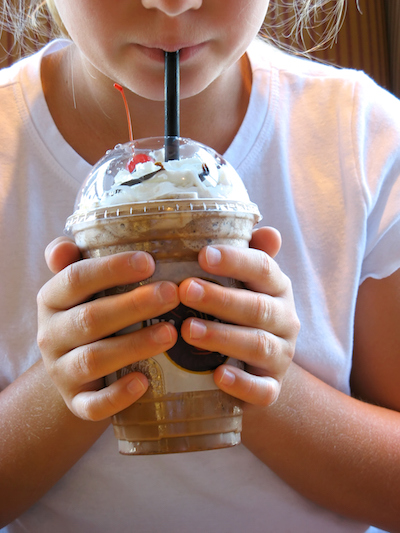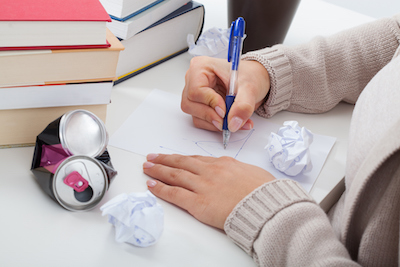Is your child over-caffeinated?
What is Caffeine?
Caffeine is the world’s most commonly used nervous system stimulant. It can occur naturally in products such as coffee, chocolate, and tea, or it can be artificially added to beverages such as sodas and energy drinks. Caffeine has been known to energize the body and improve concentration, but it should only be consumed in small doses. Even though caffeine is considered a “safe” substance by the US Food and Drug Administration (FDA), in larger doses, it could possibly be dangerous to your child’s health.
Caffeinated beverages such as energy drinks, sodas, teas, and coffee are becoming very popular with children and teens for a variety of reasons. The promise of increased concentration, energy, alertness, and improved physical performance can draw children and teens in. Many teens find that caffeinated beverages improve their focus in school, which leads to better grades. However, the widely-available substance causes a major concern for parents and doctors. The more a child depends on caffeine every day to function, the more likely they will become dependent on it.
How much caffeine is in my child’s favorite beverage?
One cup of coffee - approximately 100mg of caffeine
12oz of brewed ice - approximately 70mg of caffeine
One cup of hot tea – approximately 48mg of caffeine
12oz soda - approximately 30-40mg of caffeine (the Food and Drug Administration (FDA) set a limit of 71mg of caffeine in a 12oz soda).
Many popular energy drinks contain around 100mg of caffeine but energy shots (which are concentrated) contain upwards to 250mg of caffeine. The amount varies from energy drink to energy drink.
How much caffeine can my child safely have?
The FDA has not yet set any specific guidelines for safe caffeine consumption by children and adolescents. The Canadian government, however, recommends children and adolescents follow these daily caffeine limits:
4-6 years – 45mg per day
7-9 years – 62mg per day
10-12 years – 85mg per day
13-19 years– no more than 2.5mg/kg of their current body weight
(In order to find out your teens max caffeine intake, divide their weight by 2.2. Then multiply that number by 2.5mg).
 According to the American Academy of Pediatrics (AAP), adolescent caffeine intake in the United States is around 60-70mg per day, but can shoot up to a dangerously high 800mg per day. That amount is scary for parents because according to pediatricians, clinical toxicity begins at 1g (1000mg). If caffeine is consumed in excess of the safe limit, it can cause symptoms such as irritability, increase in blood pressure, rapid heart rate, sleep disturbances, and anxiety. Anxiety symptoms can be more pronounced in children and teens with a diagnosed anxiety disorder, and caffeine can make heart and nervous system disorders worse.
According to the American Academy of Pediatrics (AAP), adolescent caffeine intake in the United States is around 60-70mg per day, but can shoot up to a dangerously high 800mg per day. That amount is scary for parents because according to pediatricians, clinical toxicity begins at 1g (1000mg). If caffeine is consumed in excess of the safe limit, it can cause symptoms such as irritability, increase in blood pressure, rapid heart rate, sleep disturbances, and anxiety. Anxiety symptoms can be more pronounced in children and teens with a diagnosed anxiety disorder, and caffeine can make heart and nervous system disorders worse.
For those children who are having trouble sleeping at night, caffeine will likely make it worse. It becomes a cycle that never ends – if your child drinks caffeine to be energized for a test, he won’t be able to fall asleep at night so he stays awake until the morning hours, and then, running on lack of sleep, has to drink coffee to stay awake. As you can see, the cycle continues on and on.
What are energy drinks?
Energy drinks are flavored beverages that contain caffeine, vitamins, minerals, sugar, sweeteners, and/or herbal supplements. They are marketed to increase energy, athletic performance, and concentration. According to the AAP, stimulant-containing energy drinks should never be consumed by children and adolescents due to potential health risks. Energy drinks contain more caffeine than a can of soda; Sometimes energy drinks can exceed 500mg of caffeine, which is like drinking 14 cans of soda in one sitting! Long-term effects of energy drink consumption in children and adolescents are still unknown, so it is best to eliminate them entirely.
Many energy drinks contain guarana, which is a plant product that contains naturally concentrated caffeine. When guarana and caffeine are used in an energy drink, the caffeine amount will increase. Remember, just because something is “natural,” does not mean it is healthy or safe.
How about energy drinks during exercise?
No, no, no! Here is an easy way to understand why caffeine and sports do not mix. Caffeine causes the heart to pump faster, exercise causes the heart to pump even faster, this can then can lead to too much strain on the heart. Better to be safe than sorry - choose water or a sports drink instead.
Sports drinks and energy drinks are not created equal
Sports drinks are not the same as energy drinks- they each provide the body with completely different things. Sports drinks contain carbohydrates (sugar), electrolytes, minerals, and sometimes vitamins – which are meant to replenish the body after intense physical activity. Energy drinks give the body energy in the form of caffeine. Most children and teens are unaware of the differences between the beverages, and this can pose a risk of them unintentionally consuming high amounts of caffeine. Discuss these differences with your children.
It’s not just the caffeine that’s a problem in energy drinks
 In addition to the added caffeine in these beverages, they often contain lots of sugar and calories. We call these empty calories because they do not provide anything beneficial for the body. Energy drinks are often promoted to lead to weight loss, but due to their sugar content, they can actually lead to weight gain.
In addition to the added caffeine in these beverages, they often contain lots of sugar and calories. We call these empty calories because they do not provide anything beneficial for the body. Energy drinks are often promoted to lead to weight loss, but due to their sugar content, they can actually lead to weight gain.
What can parents do to help their overly-caffeinated child?
If your child is jittery, anxious or having trouble sleeping, they may be drinking too much caffeine. Slowly reducing the amount of coffee, soda, tea, or energy drinks in your child’s diet is a great start. If your son drinks 4 cups of coffee a day to stay awake in Algebra, then encourage him to drop to 3 cups per day, and go down from there over time. Quickly eliminating caffeine from a frequent caffeine consumer could cause caffeine withdrawal symptoms such as headaches, fatigue, drowsiness, difficulty concentrating, irritability, and depressed mood.
Encourage water, milk, herbal teas (which are caffeine free) and 100% fruit juice in replace of caffeinated beverages.







